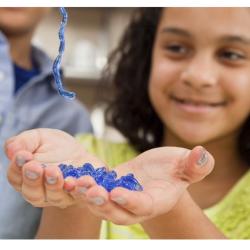Source Institutions
Source Institutions
Add to list Go to activity
Activity link broken? See if it's at the internet archive

In this activity, learners make self-assembled polymer spheres. Learners discover that self-assembly is a process by which molecules and cells form themselves into functional structures, and that self-assembly is used to make nanocapsules that can deliver medication. This activity is a fun way to talk about the connections between science and cooking, since the gummy capsules produced in this activity are also used in molecular gastronomy.
- 5 to 10 minutes
- 10 to 30 minutes
- $10 - $20 per group of students
- Ages 4 - adult
- Activity, Demonstration, Lesson/Lesson Plan
- English, Spanish
Quick Guide
Materials List (per group of students)
- Worm goo - sodium alginate
- Worm goo activator - calcium chloride crystals
- Small bowl
- Small sieve (mesh strainer) that nests inside the bowl
- Plastic spoon
Subjects
-
Engineering and Technology
-
Engineering
- Bioengineering/Biomedical Engineering
- Chemical Engineering
- Nanotechnology
-
Technology
- Medical Technology
-
Engineering
-
Life Sciences
-
Human Body
- Medicine
-
Human Body
-
Physical Sciences
-
Chemistry
- Chemical Reactions
-
States of Matter
- Solids
- Liquids
- Changes of Phase
-
Chemistry
-
The Nature of Technology
-
Technology and Society
- Impacts of Technology
-
Technology and Society
Informal Categories
- Food and Cooking
Audience
To use this activity, learners need to:
- see
- touch
Learning styles supported:
- Involves hands-on or lab activities
Other
Foreign language versions of this resource:
- Spanish: Exploring Fabrication Gummy Capsules - Sign (Spanish)
- Spanish: Exploring Fabrication Gummy Capsules - Guide (Spanish)
Components that are part of this resource:
- Exploring Fabrication Gummy Capsules - Guide
- Exploring Fabrication Gummy Capsules - Guide
- Exploring Fabrication Gummy Capsules - Sign
- Gummy Shapes
This resource is part of:
Access Rights:
- Free access
By:
Rights:
- Creative Commons: Non-commercial Share Alike (by-nc-sa), Sciencenter, 2011
Funding Sources:
- National Science Foundation, 0532536
- National Science Foundation, 0940143
